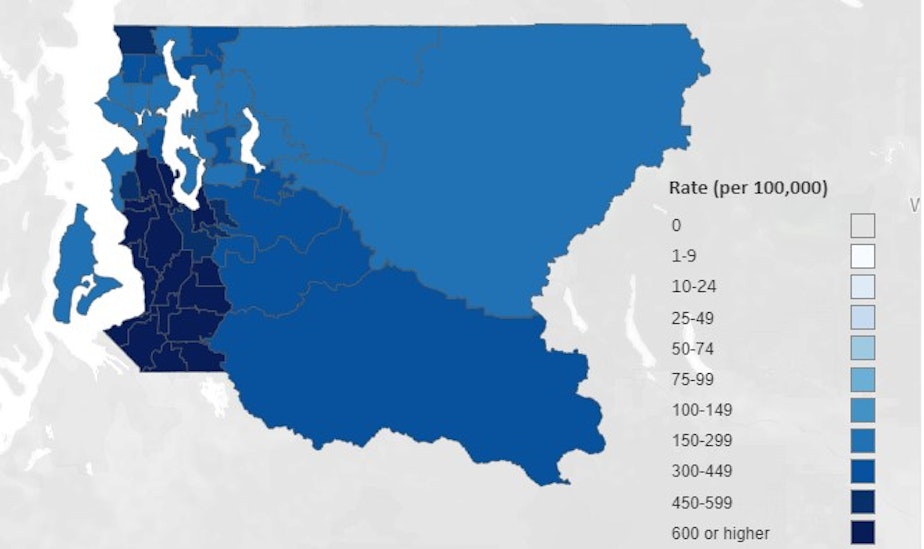A tale of two pandemics: Covid rates vary wildly across King County

South King County Covid rates are up to eight times higher than in north Seattle and Eastside.
On a chilly but sunny day in early December, a Safeway parking lot in SeaTac was full of shoppers.
Alicia Sánchez was here grocery shopping with her granddaughter. When we asked if she knew anyone who has had Covid, she said: Me, I had Covid.
“Yo y mi familia salimos todos positivos,” she said.
She and her whole family tested positive. One of Sánchez’s children got it at the warehouse where he works and unwittingly brought it into her home. She and the three family members she lives with got sick.
The coronavirus continues to surge throughout King County, but the stats look different depending on location. In parts of south King County, Covid rates are seven or eight times higher than parts of north Seattle and the Eastside.
Sponsored
About a quarter of south King County residents who have had Covid got it at work, according to public health data. That’s a higher rate than any other part of the county.
About a third got it at home.
Alicia Sánchez said her family was worried about her, because she is older and diabetic.
“In terms of symptoms, I had terrible headaches, shortness of breath, losing my sense of smell and taste, but I got through it, thank God,” she said in Spanish.
Two of her children got even sicker.
Sponsored
“They got pneumonia and had to go to the hospital, but they’re fine now, thank God,” she said.
Sánchez said she knows people are tired of using masks, but she really, really wants them to do so, because masks offer protection for themselves and everyone else.
“No one wants their loved ones to be infected,” she said. “No one wants anyone to be infected.”
Next, we headed to an Albertson’s grocery store in south Auburn, where we met Alison Saucedo, age 22.
Saucedo said she doesn’t know anyone who has had Covid. She quit her job at a grocery store at the beginning of the pandemic to avoid exposure.
Sponsored
“I’m not really worried about my health — like, I know I’m healthy; I won’t catch the virus,” Saucedo said. “But I do worry about my boyfriend’s grandma. Because she’s 90 years old. We have to be careful where we go and what we do because of her.”
Saucedo lives with her 1-year-old son and her boyfriend’s mom.
Almost everyone we talked to in south King County had to keep going to work — jobs in factories and stores or as cleaners. In-person work. Or, like Alison Saucedo, they had to choose between having an income and risking exposure to the virus.
Many of them, like Saucedo, and like Alicia Sanchez in SeaTac, live in multi-generational homes.
That’s different from what we found in Carnation, about 45 minutes from Seattle.
Sponsored

This area around the Snoqualmie Valley had the lowest rate of Covid in King County when we visited. For every 100,000 people in the area, around 180 tested positive for Covid during the last two weeks of November, according to data from Public Health -- Seattle & King County.
That’s a fraction of the rate in Auburn, where we met Alison Saucedo.
We come across Baj and Kari Kochar, who are out for their daily mental health walk at the park. They don’t know anyone in town who has gotten Covid.
But they do know people out of town, including two cousins, one an emergency room doctor in Indiana. “And another cousin who’s gotten it lives in Georgia,” said Baj Kochar. “She’s a college student. Fortunately they’re both still okay, so far.”
Sponsored
Across a large field, kids bound about a playground.
“A lot of people on our street, in our neighborhood, are working from a home office,” said Katie Tasa, a mom standing next to her pandemic-pod neighbor watching their kids together.
With so many people working from home, it’s unlikely they will get sick at work, as in south King County. A sixth of people who got Covid in east King County were most likely exposed at a non-healthcare workplace, according to public health data covering late September to late November.
It’s more common for them to get infected out in the community, shopping and socializing -- almost a quarter of folks in this region got it that way.
In nearby Duvall, Jarrett Fannin was visiting from a few miles north in Snohomish County. He says he knows a handful of people with Covid.
“My friend in Arizona, he’s 23 years old, and he just had diabetes and he was hospitalized for a month,” Fannin said.
And a few in Snohomish County, like one friend who lost her sense of taste.
“Days after she stopped her coughing, she was still biting into onions and nothing was happening,” he says.
Snohomish County is where the first coronavirus case was detected in the U.S.
This virus is not a hoax to him, he said.
“I’m like yo, I have friends who have almost died from it, so you know, wear your mask,” he said.





